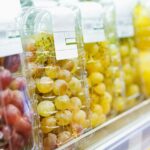Mr. Lucky’s considered priorities

It would be easier to focus on corporate profits than to consider the importance of corporate sustainability, says Miguel Usabiaga, president of Mr. Lucky. New product development and growth must be done. “But if you don't have pillars: to be socially responsible, community involvement and the responsibility to be environmentally accountable, we don't think that the other stuff is going to take place. So that’s where we’re focusing now.”
Owned and founded by the Usabiaga family, Mr. Lucky is a large vegetable grower-packer-salad processor, and exporter, based in Cortazar, Guanajuato, Mexico.
Given climate change and all the weather patterns that we've seen in the last few years, we've got to make sure that we are sustainable and responsible for the environment. So, we're going back and trying to figure out what is the best thing that we can do, so we can stay sustainable and return something to Mother Earth.”
Labor and the wider category of human resources are directly tied, in Usabiaga’s view.
There are plenty of workers available, he says. “But we have to create the excitement for people to come and work. And that's what we're trying to do. It’s one thing to work because you need to work but we can write a different story if we can have team members who want to come to work. Also, if you can add to that 10 or 15% on wanting to come to work because it's exciting - because it's fun – ‘Because I'm getting something besides money from it!’ - I think it's definitely going to make a difference.”
Usabiaga wants to see his people smile at work: “If you live a happy life, you're going to be a more productive human.”
Beyond Mr. Lucky’s labor force, comes the opportunity to create a difference in the community. This involves not only direct employees (teammates) “but everyone in the communities that we touch, we have some type of influence. That's more important than the bottom line sometimes. We must make sure that the communities are well taken care of, and that our work teammates are better off every year.
Related articles: Chilean cherries hit by unexpected November rains
For children aged seven to 14, Mr. Lucky sponsors schools and sports centers in the rural communities in Mexico. The firm also sponsors soccer and baseball schools. It is starting a basketball school and operates two music schools.
“We also are making a lot of infrastructure projects, including, potable water and school infrastructure for the communities.”
For years Mr. Lucky has applied state-of-the-art procedures for organic field production. It operates 125 acres of high-tech hothouses. The firm captures water rolling off the roofs of its greenhouses and has bogs to capture water from the fields. Cuttings from the firm’s sophisticated salad processing facility are composted to become fertilizer.
Mr. Lucky is producing new, tasty vegetable varieties and boosting domestic sales in Mexico as well as in the U.S. and Canada. Usabiaga stresses that millions of Mexican consumers are shopping for safe, high-end, top-quality vegetables.
A move toward bio-degradable packaging “didn't get the traction that we thought it was going to get.” Mr. Lucky hasn’t given up on the concept. Nevertheless Mr. Lucky is committed to using less packaging, cutting back on the packaging used to process and pack its produce. The firm is moving from waxed cardboard boxes to a PET-based box that can get wet, and be recycled.
“We are committed to making the world a better place, while also running a successful business.”








































